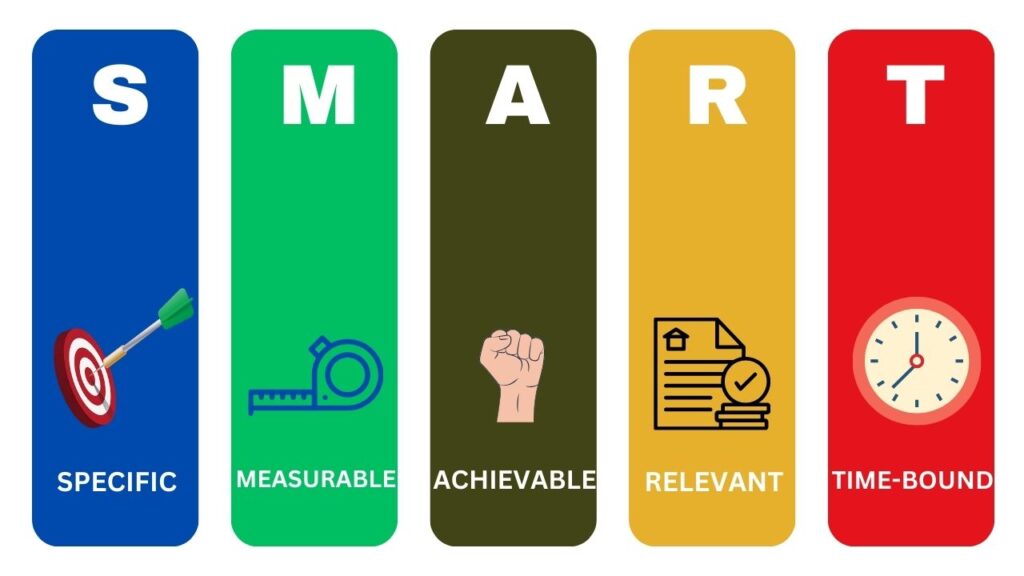Personal growth is a journey that often requires conscious effort and direction. To make meaningful progress, it’s essential to set clear objectives that guide your efforts and measure your success. This is where SMART goals come into play. SMART is an acronym that stands for Specific, Measurable, Achievable, Relevant, and Time-bound. Incorporating these principles into your goal-setting process can significantly enhance your ability to achieve personal growth. In this practical guide, we will examine the concept of SMART goals and how to effectively apply them to your personal development journey.
Jump to Section:
ToggleUnderstanding SMART Goals
Let’s begin by going more detail into the exposition of the components of SMART setting as hinted in our introduction.
1. Specific
The first element of SMART goals is specificity. Instead of setting vague, general goals like “I want to get better at my job,” you should aim for clarity and precision. A specific goal might be “I want to improve my professional skills by reading 6 books relevant to my field and learning and implementing new methodologies within the next six months.”
Specific goals provide focus and help you understand precisely what needs to be accomplished. They act as a roadmap, guiding your actions and decisions in a clear direction.
2. Measurable
Measurable goals are those that can be quantified or assessed in some way. They allow you to track your progress and determine when you have achieved your objective. Continuing with the previous example, you can measure your progress by tracking the number of books and new principles you’ve successfully learnt and implemented or by assessing your overall professional competence and quality.
Measurable goals provide a sense of achievement as you reach milestones along the way. They also help you identify if you’re falling short and need to adjust your approach.
3. Achievable
Setting achievable goals means considering whether your objective is realistic and attainable within your current circumstances. While it’s good to challenge yourself, setting goals that are too ambitious can lead to frustration and burnout.
Take into account your available resources, time, and skills when setting goals. If your current skill level is at a beginner stage, aiming to become an expert in a month might not be realistic. Instead, break down the goal into smaller, achievable steps.
4. Relevant
Relevance is all about ensuring that your goals align with your broader objectives and values. Ask yourself why a particular goal matters to you and how it contributes to your personal growth.
Goals should be relevant in the sense that they should have a purpose and significance in your life. A relevant goal could be, “I want to improve my public speaking skills because it will enhance my ability to lead and inspire others in my career.”
5. Time-bound
Finally, every goal needs a timeline. Without a deadline, there’s no sense of urgency, and it’s easy to procrastinate. A time-bound goal specifies when you plan to achieve it. This could be a daily, weekly, monthly, or yearly deadline, depending on the nature of the goal.
For example, “I will complete a 30-minute language learning session every day for six months to become conversationally fluent in Spanish” is a time-bound goal.
The Benefits of SMART Goals for Personal Growth
Now that we’ve broken down the SMART criteria, let’s examine why these principles are crucial for personal growth.
1. Clarity and Focus
SMART goals provide clarity and focus by defining precisely what you want to achieve. They act as a roadmap, helping you stay on track and avoid distractions. This clarity eliminates ambiguity and makes it easier to channel your efforts effectively.
2. Motivation and Accountability
Measurable and time-bound goals create a sense of motivation and accountability. When you can see your progress and have a deadline to meet, you’re more likely to stay committed and take consistent action.
3. Realistic Expectations
By considering the achievability of your goals, you set yourself up for success rather than failure. Realistic goals prevent disappointment and frustration, fostering a positive attitude toward personal growth.
4. Alignment with Values
SMART goals ensure that your personal growth efforts align with your values and long-term objectives. This alignment increases your sense of purpose and fulfilment as you work towards meaningful goals.
5. Continuous Improvement
SMART goals promote continuous improvement by breaking down larger objectives into manageable steps. As you achieve these smaller milestones, you gain confidence and motivation to tackle more significant challenges.
Examples of SMART Goals for Personal Growth
Below are some examples of SMART goals across various aspects of personal growth:
 1. Career Development
1. Career Development
Goal: “I will complete a professional certification course relevant to my field within the next nine months, aiming to secure a promotion or salary increase.”
- Specific: Obtaining a professional certification.
- Measurable: Completing the course within nine months.
- Achievable: Depending on your schedule and resources.
- Relevant: Enhancing career prospects and income.
- Time-bound: A deadline of nine months.
2. Physical Health
Goal: “I will lose 4kg in three months by following a balanced diet and exercising for at least 30 minutes five days a week.”
- Specific: Losing 4kg.
- Measurable: Tracking weight loss progress.
- Achievable: Realistic weight loss over three months.
- Relevant: Improving overall health and well-being.
- Time-bound: Achieving the goal in three months.






